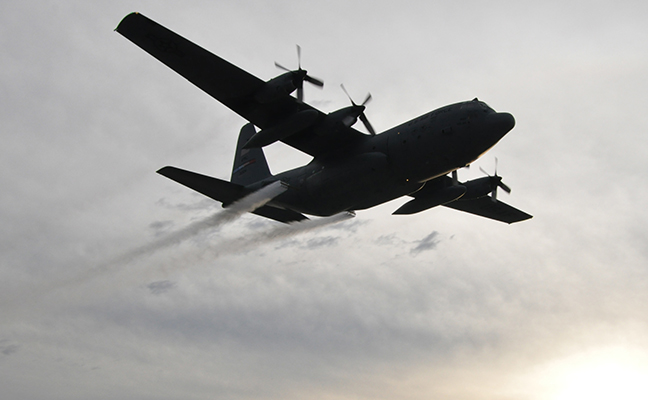Following the devastation of Hurricane Harvey, the U.S. Air Force Reserve’s 910th Airlift Wing is assisting with recovery efforts in eastern Texas by administering mosquito aerial spray applications.
The 910th Airlift Wing, in Vienna Township, Ohio, operates the Department of Defense’s only aerial spray capability to manage pest insect populations, eliminate undesired and invasive vegetation and disperse oil spills in large bodies of water. Due to large amounts of standing, polluted water, populations of pest insects that can transmit diseases are increasing significantly, posing a health risk to rescue workers and residents of Houston. Authorities have requested the 910th Airlift Wing to potentially treat more than six million affected acres.
On Sept. 8, four Air Force Reserve aircraft and nearly 70 Reserve Citizen Airmen flew to Lackland Air Force Base in Texas to begin aerial spray applications in coordination with the Federal Emergency Management Agency and the Centers for Disease Control.

A modified U.S. C-130 aircraft, assigned to the 910th Airlift Wing, sprays water simulating a pesticide solution during a field exercise as part of the Department of Defense Aerial Spray Certification Course at the Lee County Mosquito Control District flightline here, Jan. 13, 2016. Youngstown Air Reserve Station’s 910th Airlift Wing is home to the Department of Defense’s only aerial spray mission.
Photo: U.S. Air Force photo/Master Sgt. Bob Barko Jr.
This mission is primarily targeting mosquitoes, which are capable of transmitting diseases such as malaria, West Nile virus, Zika and various types of encephalitis. Increased populations of pest insects can eventually lead to individual cases or widespread outbreak of these diseases.
The aerial spray flight also is now able to operate during the night, which increases the flight’s best case spray capacity from approximately 60 thousand acres per day to approximately 190 thousand acres per day. Spray missions are normally conducted at dusk and nighttime hours when pest insects are most active, the U.S. Air Force Reserve reports.
The 910th’s customized Modular Aerial Spray System uses the Environmental Protection Agency (EPA) approved and regulated material naled, which is not used in amounts large enough to cause any concern for human health, according to the EPA. The system disperses droplets small enough to land on a mosquito’s wing, using less than one ounce of naled per acre, according to the U.S. Air Force Reserve.
In 2008, the 910th Airlift Wing supported the Federal Emergency Management Agency by treating 2,880,662 acres over Louisiana and Texas to eliminate mosquitoes in the aftermath of Hurricanes Katrina and Rita. That effort was the largest aerial spray mission ever conducted under Air Force Reserve Command.
Leave A Comment